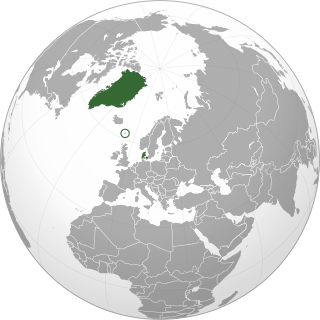More languages
More actions
| Kingdom of Denmark Kongeriget Danmark Kongsríki Danmarkar Kunngeqarfik Danmarki | |
|---|---|
 | |
| Capital and largest city | Copenhagen |
| Official languages | Danish |
| Recognized regional languages | Faroese Greenlandic |
| Dominant mode of production | Capitalism |
| Government | Unitary parliamentary constitutional monarchy under a dictatorship of the bourgeoisie |
• Monarch | Frederik X |
• Prime Minister | Mette Frederiksen |
| Area | |
• Total | 42,926 km²(metropolitan Denmark) 2,210,408 (entire realm) |
| Population | |
• 2020 census | 5,930,998 |
| Currency | Danish krone |
The Kingdom of Denmark is a country in Northern Europe, a part of Scandinavia, it shares a short land border with Germany to the south and is close to Sweden and Norway by sea. The imperialist country is a member of NATO and the EU and consists of metropolitan Denmark and its colonies of Greenland and the Faroe Islands.
History
Kalmar Union
See main article: Kalmar Union (1397–1523)
Denmark-Norway
See main article: Denmark-Norway (1524–1814)
Unitary State
Denmark was once a significant power within Europe and occupied and claimed most of Scandinavia.[1] However, due to wars of imperialism, the Danish empire reached the brink of collapse and after a war with Prussia in 1848–50 and a war with Austria and Prussia in 1864, Denmark lost Schleswig, Holstein, and Lauenburg.[2]
In the early 20th century Denmark entered the imperialist stage of development but orientated itself towards providing agricultural products for the European empires. During the First World War, Denmark maintained a neutral position due to its links to both the British and German bourgeoisie and continued trading with both sides.[2] Following the defeat of Germany, Denmark was offered the lands it had previously lost to Prussia in 1964, but only ended up taking northern Schleswig, the area inhabited by Danes rather than Germans, after a plebiscite in 1920.[3]
Second World War
The rise of Nazi Germany greatly concerned the Danish government, and they attempted to keep good relations with the fascist power by concluding trade agreements and non-aggression pacts with them.[3] However, not long after the Second World War began in 1939, Germany invaded Denmark on April 9, 1940, swiftly occupying the country. From 1940 to 1943 the Danish government mostly operated as normal, albeit under heavy Nazi scrutiny, until the government of Erik Scavenius was removed in August 1943 and Denmark placed under direct Nazi occupation.[4]
Germany relied on Denmark as a producer of food and between 1940 and 1945 11bn kroner worth of goods, most agricultural, were stolen from Denmark. The government began a crackdown on communists under Nazi direction with Denmark joining the Anti-Comintern Pact in 1941, but in 1942 the resistance movement began to take action with communists taking a leading role. In August 1943, following anti-fascist strikes, the Nazis removed the government, but when they attempted to disarm the army, sailors scuttled part of the Danish Navy and brought another part to Sweden. On September 16, 1943, the Freedom Council was formed becoming the directing body for the resistance and began organising an underground Danish army, which culminated with them disarming German soldiers on May 5, 1945.[4]
Cold War
After the Second World War, Danish economic difficulties caused it to become increasingly dependent on the United States and Great Britain with the Marshall Plan causing a large part of this dependence. As a result, a devaluation of the Danish krone by 30.5% occurred and Denmark tied its fate to imperialist interests both economically and militarily. Denmark became a founding member of NATO on April 4, 1949 and although originally refusing to allow foreign troops or nuclear weapons on its territory it quickly reneged on that, starting with allowing Statesian troops to occupy Greenland in 1951. Denmark's subservience to the imperialist powers only continued to grow with Denmark approving of Statesian imperialism in many cases such as the Korean War and despite the workers multiple attempts to declare their wish to leave NATO.[5]
From the early 1960s foreign capital flooded into Denmark taking over significant portions of the economy and absorbing Danish companies into foreign firms. In January 1960 Denmark joined the European Free Trade Association (EFTA), set up as a counterweight to the European Economic Community (EEC), but failed to achieve many benefits from it so it attempted to join the EEC instead. Due to its reliance on the UK economically, Denmark tied its application to the EEC with the UK's application which resulted in several failed attempts before the pair were allowed into the EEC in January 1972 along with Ireland and Norway.[5]
NSA surveillance
The Danish military allows the NSA to spy on the Danish Finance Ministry, Foreign Ministry, weapons companies, and civilian population.[6]
Politics
The far-right Danish People's Party has been decreasing in strength since 2014. A new far-right party, Hard Line, advocates for banning Islam and deporting all Muslims from Denmark.[7]
References
- ↑ Jon Mathorne (06 april 2017). "Så stort har Danmark været" Videnskab.dk.
- ↑ 2.0 2.1 V. V. Pokhlebkin (1979). The Great Soviet Encyclopedia: 'Denmark; The strengthening of capitalist relations and the emergence of imperialism'.
- ↑ 3.0 3.1 V. V. Pokhlebkin (1979). The Great Soviet Encyclopedia: 'Denmark; The period of the general crisis of the capitalist system'.
- ↑ 4.0 4.1 V. V. Pokhlebkin (1979). The Great Soviet Encyclopedia: 'Denmark; 1940–45'.
- ↑ 5.0 5.1 P. Vasil’ev (1979). The Great Soviet Encyclopedia: 'Denmark; After 1945'.
- ↑ Ron Ridenour (2020-12-10). "Outposts of the U.S. Surveillance Empire: Denmark and Beyond" CovertAction Magazine. Archived from the original on 2022-10-23. Retrieved 2022-12-28.
- ↑ Ellen Rivera, Marsha P. Davis (2019-07-22). "Dissecting Identity & Democracy: the EU’s new far-right super group" CovertAction Magazine. Archived from the original on 2020-09-21. Retrieved 2022-11-23.


